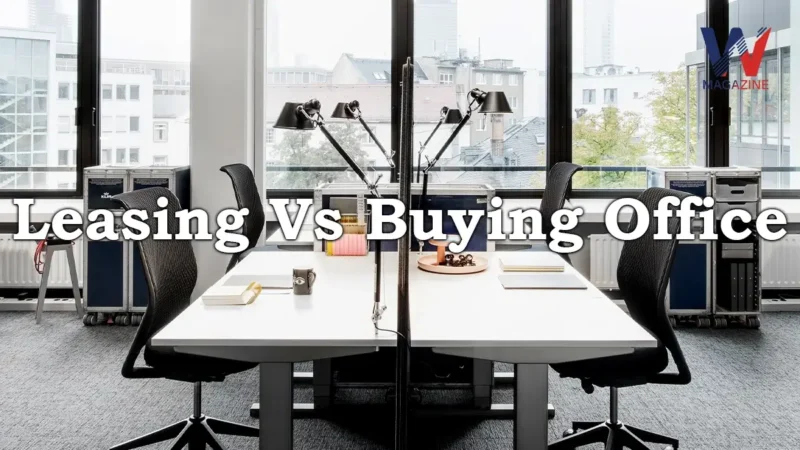Table of Contents
If your office is starting to feel crowded, it’s time to consider finding a new place. When looking for a new office space you should think about several factors including the amount of space needed, essential amenities like parking and arrangements for any hybrid workers. Initially, the most crucial decision to make is whether to lease or buy your new space.
For growing companies with substantial revenues or capital, purchasing an office space could be a feasible option. However, even if you can afford the upfront cost, you need to consider, either it’s the best way to spend your money. It’s essential to weigh the advantages and disadvantages of both buying and leasing an office before making this significant decision. Wordle Magazine has come up with some pros and cons to help kick off the discussion.
Choosing to Lease or Buy Office Space
Commitment to Location
Short-term, leasing has shown to be more cost-effective. However, if you’re eyeing a space for your headquarters for ten years or more, buying might be the better financial move. Typically, seven years is the break-even point where buying becomes more advantageous than leasing but this can vary depending on specific circumstances. Be sure to check the financial considerations section below for more details before making your decision.
Business Growth Dynamics
If you foresee significant expansion in the near future, leasing offers the flexibility to relocate if you quickly outgrow your space. Conversely, buying might leave you with either too much space or too little, incurring additional costs either way. This flexibility is also crucial if there’s a potential you might need to downsize in the coming years.
Local Economic Conditions
There was a time when real estate was a safe bet but now, it’s more unpredictable (In the current time, the best option is Digital Real Estate). If your local economy is recovering from a downturn, it could be a strategic time to invest in property. However, if property values are dropping or appear overpriced, leasing could provide a prime location without the financial risks associated with a potential decline in property value.
As you process this information, consider each factor’s relevance to your situation to guide your decision on whether to lease or buy.
Pros & Cons of Leasing
The primary benefits of leasing include low upfront commitment, flexibility and ease of upkeep. However, you give up equity and control of your facility.
Pros of Leasing Office Space
- Low Initial Financial Commitment: Only a deposit required, not a large down payment.
- Tax Benefits: Lease payments are tax-deductible.
- Maintenance-Free: The landlord handles all repairs and maintenance.
- Customizable Spaces: Some landlords will modify the space to suit your needs.
- Prime Locations: More affordable access to nicer areas than might be possible with purchasing.
- Improved Cash Flow: Helps enhance your credit rating by freeing up capital.
- Included Utilities: Landlords may cover costs like waste management, water or housekeeping.
- Flexibility to Move: Easier to relocate if the space no longer meets your needs.
Cons of Leasing Office Space
- Broker Fees: If using a broker, annual fees are often a percentage of the lease amount and negotiable.
- Increasing Rent: Rent typically rises upon lease renewal.
- Dependent on Landlord: At the mercy of the landlord for timely and quality repairs.
- Usage Restrictions: Landlord rules may limit how you use the property, affecting storage of vehicles and materials.
- Potential Landlord Changes: Good landlord relationships can change if property ownership changes.
“When leasing a space, improvements may result in an increase in rent when your lease is up for renewal.”
Analyzing the Pros & Cons of Buying Office Space
Benefits of Buying
- Equity Building: Owning office space allows you to build equity, which can be leveraged for loans.
- Potential Rental Income: Any extra space can be rented out, providing an additional revenue stream.
- Fixed Mortgage Payments: Mortgage payments remain consistent, avoiding unexpected rent increases.
- Tax Deductions: Interest payments on your mortgage are tax-deductible.
- Depreciation Benefits: You can claim depreciation on the building, which can reduce your taxable income.
- Full Control: You have the freedom to modify the building as needed, adhering only to local regulations.
- Property Control: Full control over the property usage.
- Retirement Profit: Upon retirement, you can sell the property and potentially use the profits to fund your retirement.
Drawbacks of Buying
- Upfront Costs: Includes substantial initial expenses like down payment, closing fees and real estate agent commissions.
- Opportunity Cost: The capital tied up in real estate could potentially be used for other business growth opportunities.
- Maintenance Responsibility: All costs for remodeling, repairs and maintenance fall on you.
- Lack of Flexibility: If you outgrow the space, relocating involves selling the property, which can be time-consuming and complex.
This Wordle Magazine breakdown provides a clear view of the advantages and disadvantages of purchasing office space, aiding in a more informed decision-making process.
Table of the pros & cons of both buying & leasing office space
| Decision Factors | Pros of Buying | Cons of Buying | Pros of Leasing | Cons of Leasing |
| Financial Commitment | Builds equity, useful as collateral for loans. | Large initial expenditures like down payments and fees. | Low initial financial commitment. | Possible broker fees if using a broker’s services. |
| Cash Flow | Potential rental income from extra space. | High opportunity cost as capital could be used elsewhere. | Better cash flow due to lower upfront costs. | Rent may increase upon lease renewal. |
| Payment Predictability | Fixed mortgage payments ensure predictability. | Responsible for all maintenance, repairs, and remodeling. | Lease payments are tax-deductible. | Dependent on landlord for timely and quality repairs. |
| Tax Benefits | Mortgage interest and building depreciation are deductible. | |||
| Operational Flexibility | Complete freedom to modify the building (within ordinances). | If you outgrow the space, selling can be time-consuming. | Landlord handles repairs and maintenance. | Usage restrictions may limit storage and other activities. |
| Property Control | Full control over property use. | Landlords may remodel to suit tenant needs. | Changes in property management or ownership can affect terms. | |
| Future Planning | Ability to sell the property for retirement profit. | Some utilities may be covered by the landlord. | ||
| Location Benefits | Often possible to lease in better locations than buying. | |||
| Relocation Flexibility | Flexibility to relocate if needs change. |
This table comprehensively compares the significant aspects of buying versus leasing office space, highlighting the financial and operational implications of each choice to help you make the right decision.
“Commercial buildings are classified as A, B, or C. Class A typically refers to new construction with modern features. Class B is slightly older and may require a few modifications, however, Class C is typically over 20 years old and may require major updates.”
Financial Factors to Consider When Deciding to Lease or Buy Office Space
Costs Over Time
It’s generally more cost-effective to buy office space, incase if you plan on staying in the same location for a long time. However, it’s crucial to crunch the numbers or consult your accountant for an in-depth cost analysis over time. This will help you understand the long-term financial implications of your decision.
Initial & Recurring Costs
- Mortgage vs. Rent: Compare the monthly costs of a mortgage against the cost of renting.
- Insurance: Factor in the cost of insuring your office space whether you own or lease.
- Down Payment vs. Security Deposit: Consider the upfront costs, down payments typically range from 10 to 25 percent, whereas security deposits are usually much less.
- Taxes: Look into the tax benefits associated with both leasing and buying.
- Maintenance Costs: Budget approximately $1.50 per square foot per year for maintenance and improvements, if you own the space.
Value & Investment Considerations
- Equity: Building equity through ownership can be beneficial but resale value should be considered cautiously.
- Opportunity Cost: Calculate what you could potentially earn if you invested your money back into your business. For buying, the down payment and any difference between monthly mortgage payments and lease payments to determine opportunity cost.
Additional Financial Obligations
- Security Deposit: Typically less than a down payment and required for leasing.
- Broker vs. Real Estate Agent Fees: Expect annual broker fees if leasing, a one-time real estate agent fee applies when buying.
- Legal Fees: Lawyer fees for lease negotiations are separate, whereas real estate commissions generally cover these when buying.
- Closing Costs: These apply only when buying a property.
- Remodeling Expenses: Consider the costs of any necessary modifications to the office space.
- Utility Costs: If your lease includes utilities, add these costs as additional expenses if you decide to buy.
Making an Informed Decision
There’s no one-size-fits-all answer to whether you should buy or lease your next office property. It depends significantly on how your business is performing, the importance of cash flow versus building equity, your preference for controlling the property versus having maintenance handled by someone else and many other variables. Go through the above mentioned factors and take your time to make a well-informed decision.









